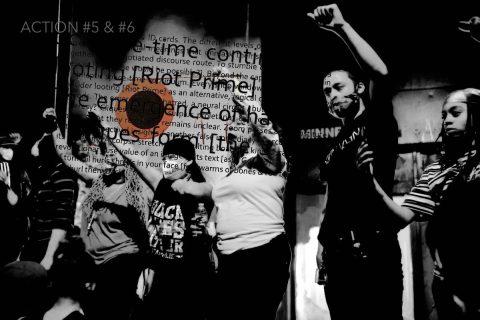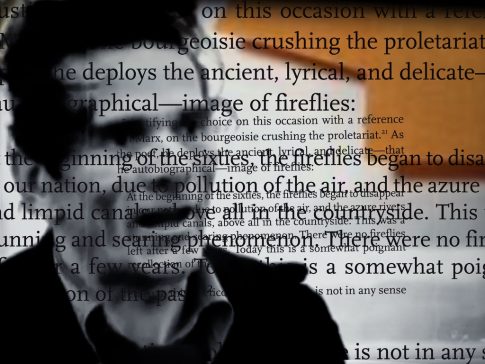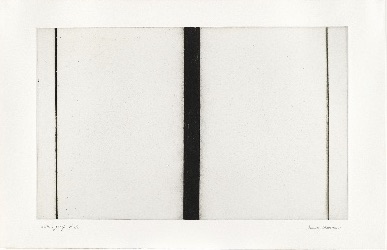:: translated by mathilda cullen they say i was having a wank in the royal parks. gunfire is a streetplan, i say. so is marx. so the type of equotations they call pistol-whips. sean bonney in june 1935, shortly after midnight, when most of the delegates had already left the huge salle de la mutualité, paul eluard delivered a speech written by andré breton at the “international writers’ congress in defense of culture” in paris. it was a reckoning with an increasingly degenerate policy of the french communist party, which had been reduced to an auxiliary wing…
Tag: Walter Benjamin
die unsichtbaren verhältnisse
they say i was having a wank in the royal parks. gunfire is a streetplan, i say. so is marx. so the type of equations they call pistol-whips. sean bonney im juni 1935 kurz nach mitternacht, als ein großteil der delegierten die riesige salle de la mutualité bereits verlassen hat, trägt paul eluard auf dem »internationalen schriftstellerkongress zur verteidigung der kultur« in paris, eine von andré breton verfaßte rede vor. es wird eine abrechnung mit einer zusehends degenerierten politik der kommunistischen partei frankreichs, die zu einem hilfstrupp der udssr und des stalinismus verkommen war und sich von dem…
ACTION #5 [THE POET AS PRODUCER] & ACTION #6 [THE BUSINESS OF MR JULIUS CAESAR AFTER BRECHT OR THE MIGRANTS OF REGGIO CALABRIA]
“Poetry has to be made by everyone, not just one.” [Lautréamont] The “interruption” is a process of shaping, i.e. the political function of separating causalities [certainties of everyday life / political life] from one another. Like Brecht’s theory of the alienation effect, which is used in epic theatre [non-Aristotelian, because empathy is a suggestion]. How assembly in the Arcades Project is not only used as a turning point, but also as a construction principle. In 1934 Benjamin wrote the essay “The Author as Producer” for the anti-fascist writers’ conference at the “Institut pour l’étude du fascisme” [the text…
Georges Didi-Huberman | Hells? (On Pier Paolo Pasolini)
Well before he described the great light of Paradise shining out in all its eschatological glory, Dante decided to reserve a quiet but significant fate, in the twenty-sixth canto of the Inferno, for the “tiny light” of those glowing worms, the fireflies. The poet is observing the eighth bolgia of hell, a political bolgia if ever there was one, since we can recognize a few eminent citizens of Florence gathered there, among others, all under the same condemnation as evil counselors. The entire space is scattered—constellated, infested—with small flames that look like fireflies, just like those that people see…
Georges Didi-Huberman | The Supposition of The Aura: The Now, The Then and Modernity (Walter Benjamin)
Walter Benjamin and History Edited by Andrew Benjamin Continuum 2005
Esther Leslie | Elective Affinities: The Hunched Man, the Old Man and B.B.
Meshwork The relationship between Benjamin and Brecht has often been assessed, including, most notoriously, the charge from both Adorno and Scholem that Brecht’s »exotic« influence was »disastrous« or »catastrophic« for Benjamin’s theorizing. Somewhat more rarely have Trotsky and Benjamin been brought together. Victor Serge in ‘Memoirs of a Revolutionary’, written in Mexico in 1942-1943, brings the two names into a constellation, suggesting the connection between Trotsky and Benjamin to be something more than coincidence, and rather more epochal: »… the poets Walter Hasenclever and Walter Benjamin commit suicide. Rudolf Hilferding and Breitscheid are carried off out of our midst…
Georges Didi-Huberman | Light against Light
The disappearance of the fireflies—when the blinding glare of spotlights crushes the weak glimmer of glowworms in the night—is an excellent poetic allegory, a lovely “speaking image” on which to build something like a general poetics of light. This allegory has become familiar to us through the intervention of a great poet, Pier Paolo Pasolini.1 So we cannot be surprised that artists and thinkers have elevated this allegory in the field of aesthetics, and that it may lend itself as the title of an art exhibit. And yet its sole purpose is to ask, stubbornly, over and over…
Walter Benjamin | The Author as Producer
II s’agit de gagner les intellectuels “la classe ouvriere, en leur faisant prendre conscience de l’identité de leurs de-marches spirituelles et de leurs conditions de producteur. – Ramon Fernandez You recall how Plato treats the poets in his projected State. In the interest of the community, he does not allow them to live there. He had a high idea of the power of poetry. But he considered it destructive, superfluous – in a perfect community, needless to say. Since then, the question of the poet’s right to exist has not often been stated with the same insistence;…
Esther Leslie | Fear Eats the Soul: Walter Benjamin & Baader Meinhof
Neither of the figures in my title – Walter Benjamin and The Baader Meinhof Group – are in any direct way associated with 1968 – indeed each brackets it in time. The one, Benjamin, was long dead by the time of the student and worker revolts, that would undoubtedly have thrilled him, even if they did not thrill his old friend Adorno, who called in the police on his revolting students. Benjamin’s adult thought emerges in the years of the Russian Revolution of 1917 and it reaches its final formulation in the dark days of Nazi rule, his death occurring…
DIE AFFÄRE LEBOVICI | PSYCHOGEOGRAPHIE [ACTE XVIII]
Zum Umsturz aller bestehenden Ordnung aufzurufen / Scheint furchtbar. / Aber das Bestehende ist keine Ordnung. // Zur Gewalt seine Zuflucht zu nehmen / Scheint böse. Aber da, was ständig geübt wird, Gewalt ist / Ist es nichts Besonderes. Bertolt Brecht Die ganze Affäre [wie auch der modus operandi] ist geprägt von einem Klima persönlichen Verrats und politischen Hinterhalts: Gérard Lebovici [Herausgeber der Editions Champ Libre, Produzent und Freund Guy Debords] in einer Tiefgarage in der Avenue Foch, Chaillot. Porte Dauphine mit vier Kugeln im Hinterkopf auf dem Vordersitz seines Wagens; Polizei, D.S.T. & Renseignements généraux zeichnen eine…
UNE INSULTE À LA REPUBLIQUE: AIMÉ CÉSAIRE AND FRIEDRICH HÖLDERLIN …
UNE INSULTE À LA RÉPUBLIQUE: AIMÉ CÉSAIRE AND FRIEDRICH HÖLDERLIN DECLARE THE FRENCH REVOLUTION A TRAGEDY, VOW TO SUPPORT #GILETSJAUNES MOVEMENT INSTEAD | by H. Bolin I. Introduction The study that follows concerns two tragic plays that treat the emergence and aftermath of a single global revolutionary horizon which included both the French and the Haitian revolutions. As the tragic genre suggests, Friedrich Hölderlin’s The Death of Empedocles (1799) and Aime Césaire’s And the Dogs Were Silent (1956) stage reflections on the initial successes and subsequent defeat of their respective revolutionary moments. What can tragedy or art offer to thinking…
riots and/or poetics [10/2018]
“History is full of people who just didn’t. They said no thank you, turned away, escaped to the desert, lived in barrels, burned down their own houses, killed their rapists, pushed away dinner, meditated into the light. Even babies refuse, and the elderly also. Animals refuse: at the zoo they gaze through Plexiglas, fling feces at human faces. Classes refuse. The poor throw their lives onto barricades, and workers slow the line. Enslaved people have always refused, poisoning the feasts and aborting the embryos, and the diligent, flamboyant jaywalkers assert themselves against traffic as the first and foremost visible daily lesson…
Sean Bonney | COMETS & BARRICADES: INSURRECTIONARY IMAGINATION IN EXILE
Sean Bonney | COMETS & BARRICADES: INSURRECTIONARY IMAGINATION IN EXILE Let every word indicate the most frightening of distances, it would still take billions of centuries, talking at one word per second, to express a distance which is only an insignificance when it comes to infinity. ¹ Louis Auguste Blanqui; Eternity by the Stars Imprisoned on the day before the declaration of the Paris Commune, in a cell in the Fort du Taureau, ‘an ellipse-shaped fortified island lying half a mile outside of the rock shores of Morlaix at a place where, after briefly morphing into the English Channel, the…
Sean Bonney | Notes on Militant Poetics
Notes on Militant Poetics 1/3 “There is a zone of nonbeing, an extraordinarily sterile and arid region, an utterly naked declivity when an authentic upheaval can be born . . . . (a) descent into a real hell” (Fanon) “Truth content becomes negative. [Poems] imitate a language beneath the helpless language of human beings: it is that of the dead speaking of stones and stars” (Adorno) The Situationists called poetry the “anti-matter of consumer society”, a fairly questionable claim, but one that is at least expressive of the chasm that operates between official reality’s definitions of poetry and those…
Esther Leslie; Crowds, Clouds, Politics and Aesthetics (Charles Baudelaire & Sean Bonney)
Sean Bonney; Baudelaire in English
Georges Didi-Huberman; To Render Sensible
Representable People, Imaginary People? Representation of the people comes up against a double difficulty, if not a double aporia, that comes from the impossibility of our subsuming each of the two terms, “representation” and “people,” into the unity of one concept. Hannah Arendt said that we will never manage to think about the political dimension as long as we stubbornly persist in speaking of man, since politics is interested precisely in something else, which is men, whose multiplicity is modulated differently each time, whether it be in conflict or community. (1) Likewise we must say, and forcefully, that we…















